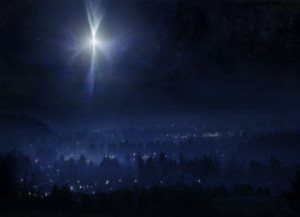Text: Isaiah 9:6,7
Category Archives: Christmas
What Star is This, With Beams so Bright?
 Article by Colin Nicholl, (original source TV documentaries on the wonders of the cosmos, and YouTube videos from the International Space Station about the oddity of watching Earth from a ‘tin can’ in space. Astronomy is the ‘wow’ science.
Article by Colin Nicholl, (original source TV documentaries on the wonders of the cosmos, and YouTube videos from the International Space Station about the oddity of watching Earth from a ‘tin can’ in space. Astronomy is the ‘wow’ science.
As fascinating as the latest missions by NASA and the European Space Agency are, to the average person nothing in astronomy is more captivating than the Star of Bethlehem. Quite simply, the whole world is engrossed by the Star. It is central to cherished Christmas traditions from Bethlehem on the West Bank to Bethlehem, Pennsylvania, from Mexico to the Ukraine, and from Poland to the Philippines. Millions flock to planetariums for special presentations in the weeks before Christmas to reflect on the Star, the greatest astronomical mystery of all. The Star features prominently in our Christmas celebrations—we sing carols to and about it; we perch it atop our Christmas trees; and we send Christmas cards embossed with it.
However, when it comes our perceptions of the Star, it is as though we view it through a deep and dark mist. Our thinking, heavily shaped by movie representations, television documentaries, planetarium presentations, Christmas decorations, and Yuletide carols, is inconsistent and confused. Have a look at recent Nativity movies or religiously themed Christmas cards in your local card shop and you’ll appreciate the truth of what I’m saying.
One factor that vies to influence our thoughts about the Star is the beloved Christmas carols that we sing so gustily. But can we trust what they say? Was the Star a new celestial body, ‘a stranger midst the orbs of light?’, that prompted the Magi to ask ‘What star is this?’ Is it true that the Star shone in the eastern sky with ‘beams so bright’ and ‘to the earth…gave great light’? Were ‘all the stars above…paling, all their luster slowly fading’ because of the Star’s ‘royal beauty bright’? Did its ‘light’ guide the Magi ‘from country far, …to follow the star wherever it went’, even as it was ‘westward leading, still proceeding’? And when the travellers arrived in Bethlehem, did the Star ‘both stop and stay right over the place where Jesus lay’?
The sources
Our most important source about the Star of Bethlehem is Matthew’s Gospel. There, in his Nativity account, we discover that the Star was first observed by the Magi over a year before Herod’s slaughter of Bethlehem’s infants. Many months after this first appearance, the Star had a ‘rising’ in the eastern sky that deeply impacted the Magi, revealing to them that someone special had been born, a king, indeed the Jewish Messiah, and commissioning them to travel hundreds of miles to honour him and present him with extravagant gifts. Then, within a couple of months of the Star’s rising (the duration of the Magi’s journey), the Star was in southern sky to usher the eastern astrologers to Bethlehem before standing over one particular house there, pinpointing it as the place where the Messiah was.
The early church father Ignatius, writing a few decades after Matthew, probably citing a first-century hymn, describes the Star: ‘A star shone in heaven with a brightness beyond all the stars; its light was indescribable, and its newness caused astonishment. And all the rest of the stars, together with the Sun and the Moon, formed a chorus to the star, yet its light far exceeded them all. And there was perplexity regarding from where this new entity came, so unlike anything else [in the heavens] was it.’
The quest for the historical Star
Wouldn’t it be amazing to know what the Star was? If we could identify the Star and discover what the Magi saw, it would enable us to get into their sandals, to feel their awe, and to think their thoughts after them. The discovery would surely fill us with joy, reinvigorate our worship, and transform our celebration of Christmas. Matthew would be vindicated against his critics. Jesus would be seen to have been authenticated as Messiah by God. The Bible’s claim that God created the heavens and is Lord over them would be even more compelling. It would have the potential to be an astonishing boost to Christian witness in this increasingly hostile, atheistic world. Can you imagine what moviemakers would be able to do with the revelation of the mystery of the Star of Bethlehem!? So exhilarating is this vision that you might have thought that Christian benefactors would be pouring their money into sponsorship of cutting-edge research to identify the Star decisively once and for all. Continue reading
Christmas & Calvinism
 Jonathan Master (PhD, University of Aberdeen) is professor of theology and dean of the School of Divinity at Cairn University. He is also director of Cairn’s Center for University Studies. Dr. Master serves as executive editor of Place for Truth and is co-chair of the Princeton Regional Conference on Reformed Theology. In an article and even many non-Christians pretend to believe – or at least to affirm that something good happened on the night Christ was born. Christmas would hardly seem to be the time to discuss the doctrines of grace. After all, we’re led to believe that Christmas is gloriously broad and Calvinism hopelessly narrow.
Jonathan Master (PhD, University of Aberdeen) is professor of theology and dean of the School of Divinity at Cairn University. He is also director of Cairn’s Center for University Studies. Dr. Master serves as executive editor of Place for Truth and is co-chair of the Princeton Regional Conference on Reformed Theology. In an article and even many non-Christians pretend to believe – or at least to affirm that something good happened on the night Christ was born. Christmas would hardly seem to be the time to discuss the doctrines of grace. After all, we’re led to believe that Christmas is gloriously broad and Calvinism hopelessly narrow.
So why insert such dour doctrines into the broad and beautiful joy we share at Christmas? Well, in the first place, these doctrines are not dour at all, or narrow. They are enlivening and glorious, and their apprehension leads immediately to the kind of overflowing joy we associate with Christmas.
But there is more than that. The reason we should associate Christmas and Calvinism is that Jesus himself does. In John 6, Jesus gives a clear reason for the incarnation. And the incarnation is what we celebrate when we celebrate Christmas rightly. He says this: “For I have come down from heaven, not to do my own will, but the will of him who sent me” (John 6:38). That broad statement of Jesus’ obedience takes further shape in the verses which follow: “And this is the will of him who sent me, that I should lose nothing of all that he has given me, but raise it up on the last day. For this is the will of my Father, that everyone who looks on the Son and believes in him should have eternal life, and I will raise him up on the last day” (6:39-40). Later in the same discussion, Jesus expands on this will of the Father which he came to earth to carry out: “No one can come to me unless the Father who sent me draws him” (6:44). And again, “It is the Spirit who gives life; the flesh is no help at all” (6:63). Finally, in response to the disciples’ questions about those who did not believe, Jesus says, “This is why I told you that no one can come to me unless it is granted him by the Father” (6:65).
Since Jesus’ stated reason for the incarnation is to do the Father’s will, it is worth looking at these teachings in a systematic fashion. First, we learn that no one can come to Jesus unless the Father draws him or grants him this (John 6:44, 65). This is because the Holy Spirit alone gives life and man in his natural state cannot find spiritual life at all; in the flesh, human beings possess nothing profitable in accomplishing salvation (John 6:63). We learn that the Son came to save those who had been given to him (John 6:39). We are told that those drawn, given, and brought to life by the Father actually come: none can resist His transforming grace (John 6:37). And then, perhaps most remarkably, we learn that Christ guarantees that all who come to him in faith, those ones who are given by the Father and transformed by the Spirit, will surely be raised up on the last day (John 6:40).
In other words, when Jesus reflects on his coming to earth, he explains it in terms of the Father’s will in salvation, a will that is displayed against the backdrop of man’s total depravity, God’s unconditional election, Christ’s definite work in salvation, God’s irresistible grace in drawing and giving men to Christ, and the glorious promise that Christ will one day raise up those who look to him in genuine faith. This is what we mean when we speak of Calvinism. And as it happens, it is also what Jesus teaches when he speaks of Christmas.
